Unit 11 单元综合复习课件(人教版英语七年级下册Unit 11 How was your school trip?)
文档属性
| 名称 | Unit 11 单元综合复习课件(人教版英语七年级下册Unit 11 How was your school trip?) |  | |
| 格式 | pptx | ||
| 文件大小 | 32.4MB | ||
| 资源类型 | 试卷 | ||
| 版本资源 | 人教新目标(Go for it)版 | ||
| 科目 | 英语 | ||
| 更新时间 | 2024-06-03 11:27:22 | ||
图片预览

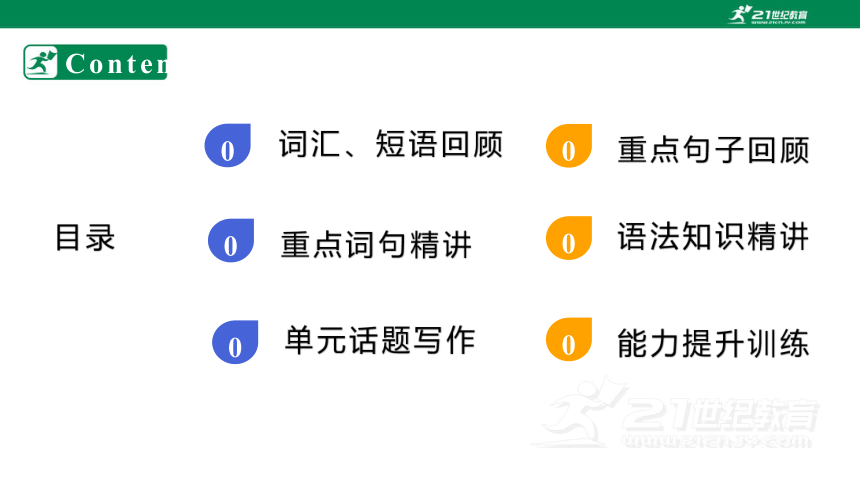

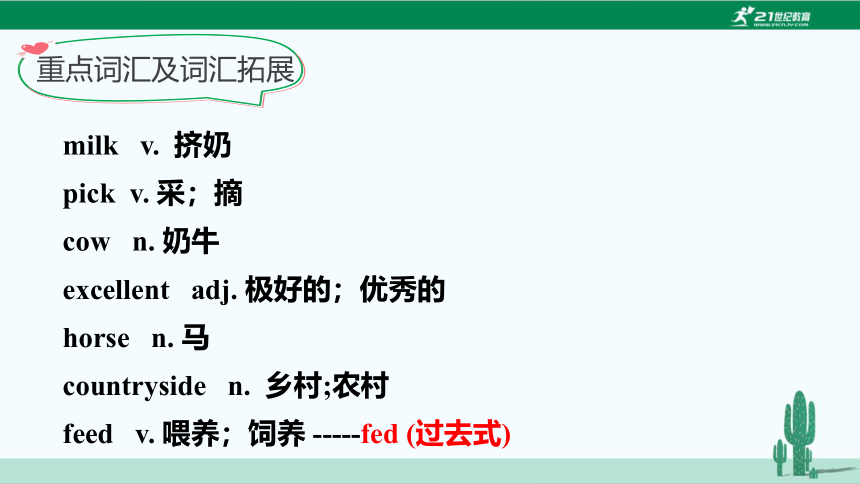
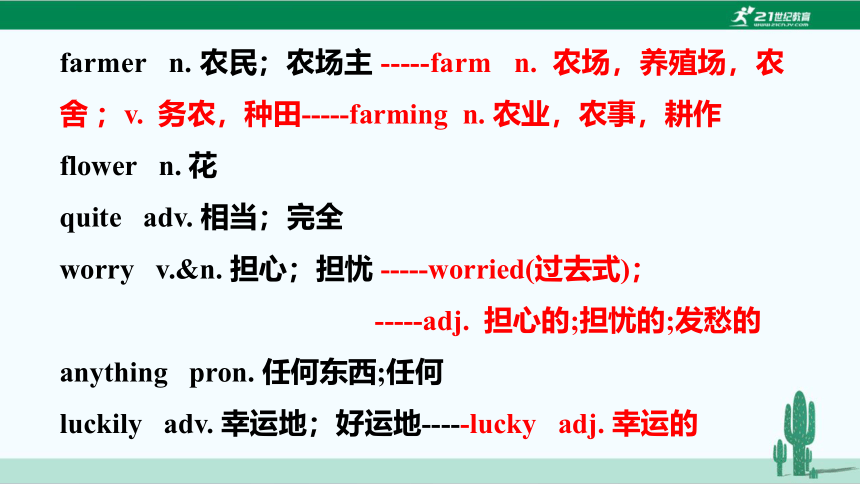
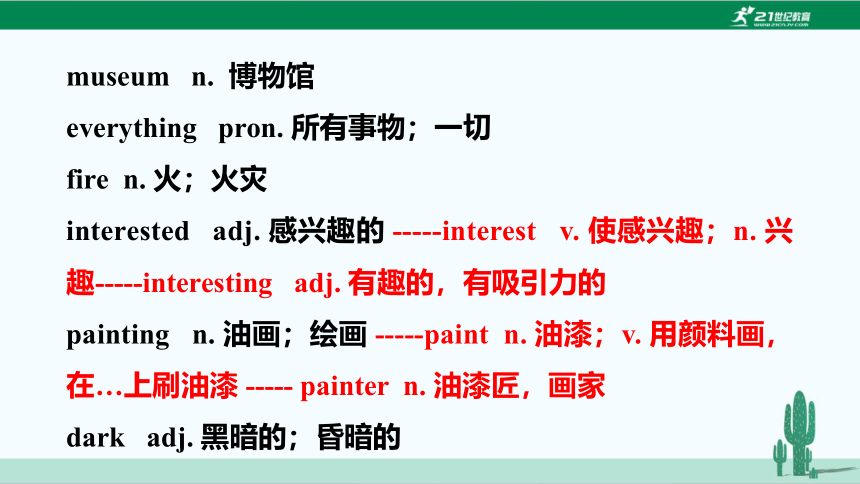

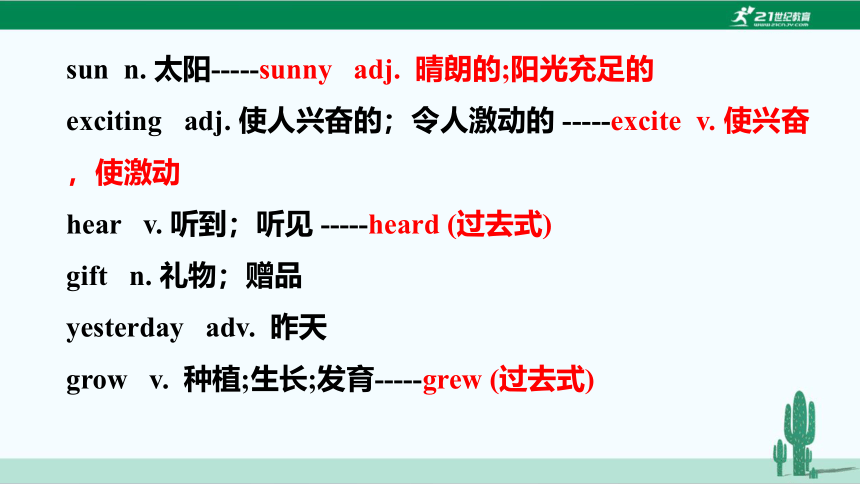

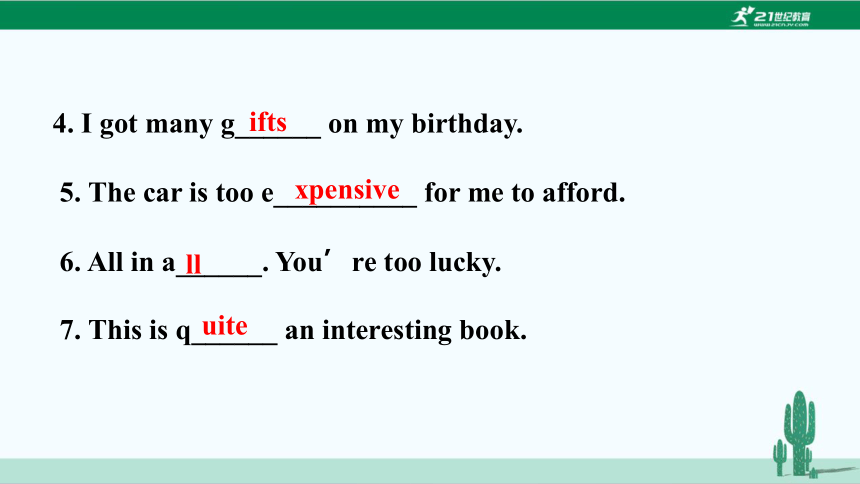
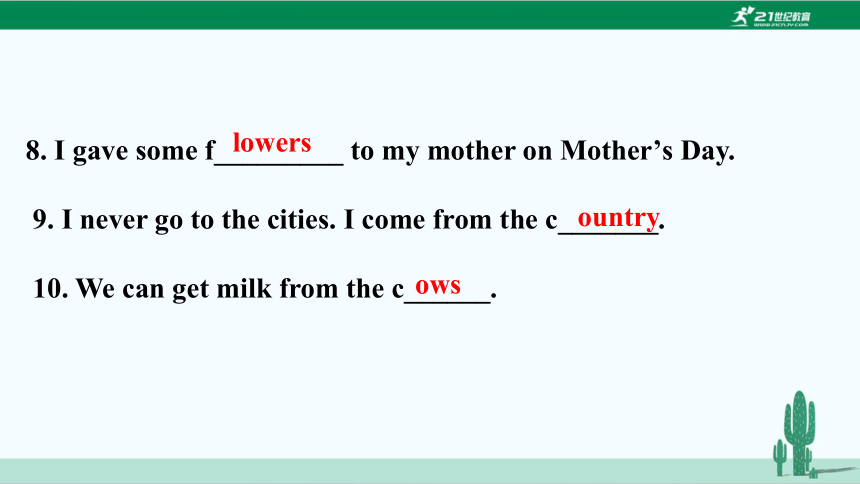
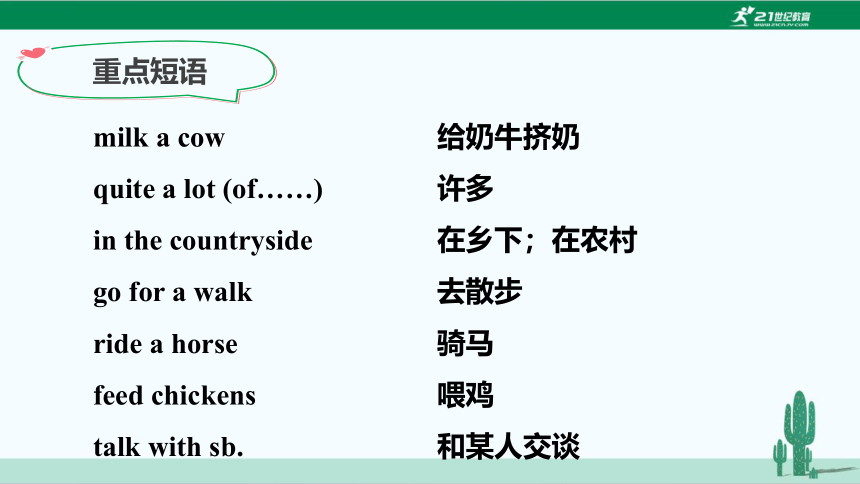
文档简介
(共72张PPT)
Unit 11 单元综合复习
人教版七年级下册
Content
词汇、短语回顾
01
重点句子回顾
02
重点词句精讲
03
语法知识精讲
04
单元话题写作
05
能力提升训练
06
目录
词汇、短语回顾
milk v. 挤奶
pick v. 采;摘
cow n. 奶牛
excellent adj. 极好的;优秀的
horse n. 马
countryside n. 乡村;农村
feed v. 喂养;饲养 -----fed (过去式)
重点词汇及词汇拓展
farmer n. 农民;农场主 -----farm n. 农场,养殖场,农舍 ;v. 务农,种田-----farming n. 农业,农事,耕作
flower n. 花
quite adv. 相当;完全
worry v.&n. 担心;担忧 -----worried(过去式);
-----adj. 担心的;担忧的;发愁的
anything pron. 任何东西;任何
luckily adv. 幸运地;好运地-----lucky adj. 幸运的
museum n. 博物馆
everything pron. 所有事物;一切
fire n. 火;火灾
interested adj. 感兴趣的 -----interest v. 使感兴趣;n. 兴趣-----interesting adj. 有趣的,有吸引力的
painting n. 油画;绘画 -----paint n. 油漆;v. 用颜料画,在…上刷油漆 ----- painter n. 油漆匠,画家
dark adj. 黑暗的;昏暗的
lovely adj. 可爱的 -----love v. 爱,喜欢
fast adv.&adj. 快地(的)
expensive adj. 昂贵的 -----cheap(反义词) adj. 便宜的
robot n. 机器人
cheap adj. 廉价的;便宜的
guide n. 导游;向导
slow adj. 缓慢的;迟缓的-----slowly adv. 缓慢地;迟缓地----- quick (反义词) adj. 快的,迅速的;adv. 迅速地,快速地
sun n. 太阳-----sunny adj. 晴朗的;阳光充足的
exciting adj. 使人兴奋的;令人激动的 -----excite v. 使兴奋,使激动
hear v. 听到;听见 -----heard (过去式)
gift n. 礼物;赠品
yesterday adv. 昨天
grow v. 种植;生长;发育-----grew (过去式)
一、根据句意及汉语或首字母提示完成单词。
即讲即练
1. She is badly ill and her mother is w______ about the health.
2. Look at the apple on the trees. Can you p______ one for me
3. Slow down! You’re driving too f______.
orried
ick
ast
4. I got many g______ on my birthday.
5. The car is too e__________ for me to afford.
6. All in a______. You’re too lucky.
7. This is q______ an interesting book.
ifts
xpensive
ll
uite
8. I gave some f_________ to my mother on Mother’s Day.
9. I never go to the cities. I come from the c_______.
10. We can get milk from the c______.
lowers
ountry
ows
milk a cow 给奶牛挤奶
quite a lot (of……) 许多
in the countryside 在乡下;在农村
go for a walk 去散步
ride a horse 骑马
feed chickens 喂鸡
talk with sb. 和某人交谈
重点短语
take photos/pictures 拍照
ask sb. questions 问某人问题
show sb. around… 带领某人参观…
grow apples 种植苹果
learn…about… 学习…有关…
from…to… 从…到…
pick strawberries 摘草莓
visit sb. 看望某人
fire station 消防站
go on a school trip 参加学校郊游
all in all 总的来说
be interested in 对……感兴趣
see some paintings 参观画展
draw pictures 画画
by bus 乘公交车
have a nice weekend 度过一个愉快的周末
a boring day 令人乏味的一天
go fishing 去钓鱼
eat/have one's lunch 吃某人的午饭
under a tree 在树下
come out (太阳、月亮或星星)出现
go on a trip 去旅游
along the way 沿途
play chess with sb. 与某人一起下棋
make a model robot 制作机器人模型
buy sth. for sb. 给某人买某物
an exciting day 令人兴奋的一天
It's difficult to do sth. 做某事很难
not……at all 一点儿也不,根本不
即讲即练
1. 你对英语感兴趣吗?
Are you ________ _________ English
2. 你能告诉我如何制机器人吗
Can you tell me ________ ________ ________ a robot
3. 他一点也不喜欢弹钢琴。
He _______like playing the piano________ ________.
一、根据汉语提示完成句子。
interested in
doesn’t at all
how to make
4. 礼品店的东西太贵了,所以我什么也没买。
The things in the gift shop were _______ ________, _______ I didn’t buy anything.
5. 这个夏天我们去了乡下。
We _______ _______ the ___________ this summer.
6. 对于大多数孩子来说,周末是有趣的。
_______ _______ ________, the weekend was fun.
For most kids
too expensive so
went to countryside
重点句子回顾
1.—How was your trip last week 上周你的旅行怎么样?
—It was excellent. 棒极了。
2.—Did you go to the zoo 你去动物园了吗?
—No, I didn't. I went to a farm. 不,我没有。我去农场了。
3.—Did you see any cows 你见到奶牛了吗?
—Yes, I did. I saw quite a lot. 我见到了,而且见到了很多。
4.—Did Carol take any photos 卡萝尔拍照片了吗?
—Yes, she did. 拍了。
5.I visited my grandparents in the countryside. 我去乡下看望了爷爷奶奶。
6.It was so much fun. 那真是蛮好玩的。
7.Carol picked some strawberries and took them home.
卡罗尔摘了一些草莓并把它们带回了家。
8.Today I went on a school trip. 今天我参加学校旅行了。
9.Then the guide taught us how to make a model robot.
然后,导游教我们怎样制作一个机器人模型。
10.I didn't like the trip at all. 我一点儿都不喜欢这次旅行。
11.At the museum, I learned a lot about robots. 在博物馆,我对机器人了解了许多。
12.It was difficult to take photos. 拍照很难。
13.All in all, it was an exciting day. 总的说来,这是令人兴奋的一天。
重点词句精讲
1.quite a lot
a lot 作名词短语,表示“很多、多量”,在句中作主语、宾语或表语。
eg:He's given her a lot to eat.他给了她许多好吃的东西。
a lot作副词短语,在句中作程度状语,表示“很、非常、常常”,可以被such,what,quite等修饰,例如:quite a lot意为“相当多”。
eg:I like him quite a lot. 我非常喜欢他。
【拓展】a lot,a lot of,lots of
a lot后面不能接名词
a lot of相当于lots of,可接可数名词复数或不可数名词。
eg:I have quite a lot of work to do. 我有相当多的工作要做。
—Did you see any cows 你看到一些奶牛了吗
—Yes , I did. I saw quite a lot. 是的,我看到相当多(的奶牛)。
2.quite与very
quite 程度副词,意为“相当,非常”,可修饰副词、形容词、动词,与表达程度的词连用。
very 程度副词,意为“很,非常”,语气较quite重,可修饰副词、形容词,但不可直接修饰动词。
quite/very与不定冠词连用时位置不同:“a+very+形容词+名词”和“quite a(n)+形容词+名词” eg:Tom was quite a good boy. 汤姆是个好孩子。
=Tom was a very good boy.
3.milk a cow
milk n. 牛奶(不可数); vt. 给……挤奶;vi. 挤奶,出奶
milk a cow 挤牛奶
eg:I helped my father to milk the cow. 我帮助我的父亲挤牛奶。
Would you like some milk 你想喝些牛奶吗?
4.fed chickens
fed为feed的过去式,feed此处作及物动词,意为“喂养;饲养”。
feed sth. to sb./sth.把某物喂给某人/某物;feed……on/with……用……喂养;
feed on……以……为食
eg:Don't forget to feed your pet dog. 别忘了喂你的宠物狗。
She fed milk to the baby.=She fed the baby on/with milk. 她用牛奶喂婴儿。
Pandas feed on bamboo. 熊猫以竹子为食。
5.anything用法
anything 不定代词,表示“某事,某东西”
主要用于否定句或疑问句中,用以代替something
eg:Did you learn anything 你学到什么东西了吗?
We can't believe anything he says. 我们都不能相信他说的任何事情。
【拓展】
在表示请求、建议或征求意见的疑问句中常用 something,不用anything。
eg:Would you like something to drink 你想要些喝的东西吗?
表示“任何事,任何东西”,主要用于肯定句中。
eg:I want something to eat, and anything will do. 我想吃点儿东西,任何东西都行。
用作主语时,谓语用单数
eg:Anything is better than nothing.有点儿总比什么都没有要好,不是吗?
修饰anything的形容词应置于其后。
eg:Did you hear anything interesting there 你在那儿听到什么有趣的事情了吗?
6.farmer
farm n. 农场; v. 耕种,干农活儿
farmer n. 农民;农场主
farming n.农事;耕作
eg:He is farming in Africa. 他正在非洲务农。
It is still too cold for farming. 天气还是太冷,不适合农耕。
The farmer is at work on a farm. 这位农民在农场千活儿。
Carol learned a lot about farming. 卡罗尔了解了很多农事。
7.bring与take
bring vt. 带来;取来 反义词: take vt. 拿走
bring表示运动轨迹由远及近,take表示运动轨迹由近及远,也表示随身携带。
短语:bring sth. /sb. to……意为“把某物/某人带到……”。
eg:Can we bring music players to school 我们可以带音乐播放器到学校吗?
It's raining outside, please take an umbrella. 外面正在下雨,请带一把伞。
Take the umbrella with you. 你随身带把伞。
8.pick up
pick vt. 采;摘
pick up 拾起;捡起
pick up是“动词+副词”型短语,代词作宾语时必须放中间。
eg:Carol picked some strawberries and took them home.
卡罗尔摘了一些草莓并把它们带回了家里。
children are picking tomatoes in the garden. 孩子们正在园子里摘西红柿。
My pen is under your chair. Can you pick it up for me
我的钢笔在你的椅子底下。你能帮我捡起来吗?
9.so much与so many
so much “如此多;这么多”,修饰不可数名词或动词。
so many “这么多;如此多”,常用来修饰可数名词复数。
eg:It was so much fun. 那真是挺好玩的。
There was so much noise in the classroom . 教室里太吵了。
You talked so much. 你说得太多了。
He had so many friends in the city. 在这个城市里,他有这么多的朋友。
10.fun用法
fun n. 乐趣,开心,有趣的人或事
其前常用great, much, a lot of等修饰,用来加强语气。
funny adj. 有趣的
eg:He's great fun, and his dog is great fun, too. 他是个有趣的人,他的狗也很有趣。
Skating is great fun. 滑冰是件很有趣的事情。
11.worry用法
worry vt. 担心;担忧
worry abou 担心
worried adj. 担心的;烦恼的
eg:we worried it would rain. 我们担心会下雨。
Don't worry. We have plenty of time. 不必担心。我们有很多时间。
Don't worry about John. 不要担心约翰。
She is always worried about her son. 她总是担心她的儿子。
12.fire station消防站
fire作物质名词“火”,为不可数名词;作“炉火,取暖器”,是可数名词
常用结构为:be on fire着火;make a fire生火
eg:Don't play with fire, because it's very dangerous. 不要玩火,因为它很危险。
There was a big fire in the next street last night. 昨晚邻街起了大火。
The factory was on fire yesterday. 昨天那家工厂着火了。
Let's make a fire. 让我们生火吧。
13.expensive
expensive adj. 昂贵的;价格高的
说价格高或低要用形容词high或low,而不能用expensive或cheap。一般商品作主语时才用expensive或cheap。
eg:This is an expensive hat. 这是一顶昂贵的帽子。
The price of this bag is high. 这个包的价格很高。
14.teach用法
teach作及物动词,后面可以接“疑问词+动词不定式”。
其名词形式为teacher“老师”;teach的过去式taught,
常用短语:teach oneself意为“自学",相当于learn by oneself。
eg:Then the guide taught us how to make a model robot.然后,导游教我们怎样制作一个机器人模型。
Let me teach you how to use the computer. 让我教你怎么操作电脑My mother often teaches me how to cook food. 我的妈妈经常教我怎样做饭。
15.lovely
lovely adj. 可爱的;美丽的
【拓展】以-ly结尾的形容词。
friendly友好的,lively生动的,活跃的, lonely孤单的,寂寞的
eg:What a lovely girl! 多么可爱的女孩儿!
After that ,I went to the gift shop and bought some lovely gifts for my parents.之后,我去了礼品店,买了一些可爱的礼物给我的父母。
We can see lovely views here. 在这里我们能看到美丽的景色。
16.all in all, in all 与 at all
all in all意为“总的来说;总之;整体上说”,用于句首,对所阐述的内容进行概括性总结及归纳。
in all 意为“总共,合计”,可放在句首,也可放在句末。
at all意为“根本”;常用于否定句中,not at all意为“根本不
eg:All in all ,it was an exciting day. 总之,这是令人兴奋的一天。
All in all, it is a great success. 总的来说,它非常成功。
There are thirty students in all. 共有30名学生。
17.everything
everything不定代词,意为“所有事物;一切”。
everything作主语时,谓语动词用单数形式。
everything等不定代词被形容词修饰时,置于这些不定代词的后面。
eg:Everything was about robots and I'm not interested in that.
一切都是关于机器人的,我对那方面不感兴趣
Many parents try to do everything for their children.
许多父母努力为孩子做所有的事情。
Everything is cheap here. 这里的一切都很便宜。
18.interested与interesting
interested adj. 感兴趣的
interesting adj. 有趣的;令人感兴趣的
interested常用于修饰或描述人,interesting常用于修饰或描述物。
eg:He is interested in the interesting book. 他对那本有趣的书感兴趣。
Are you interested in dancing 你对跳舞感兴趣吗?
【拓展】-ed形式的形容词,一般用来形容人的感受,表示“感到……的”,主语通常是人;-ing形式的形容词,一般用来形容事或物本身具有的性质,也可表示某物让人具有的某种感觉,表示“令人……的”,主语通常是物。
eg:They were excited about the exciting news. 他们对这个令人兴奋的消息很兴奋。
I’m bored with what he said. 我对他说的话厌烦极了。
I find the story very boring. 我发现这个故事很无聊。
19.dark用法
◆ dark adj. 黑暗的;昏暗的; 反义词:bright 光明的。
eg:The rooms were really dark and it was difficult to take photos.房间真的很暗并且拍照很难。
It's getting dark. 天快黑了。
◆ dark adj.(颜色)深的; 反义词为:light(颜色)浅的
eg:I like dark blue. 我喜欢深蓝色。
◆ dark n. 黑暗,暗处
eg:She could see nothing in the dark. 她在黑暗中什么也看不见
20.hear, listen与listen to
hear 意为“听到;听见”,强调听的结果。
listen强调的是听的动作,它单独使用,是提醒对方注意。
listen要表示听什么,需要加to才能接人或物作宾语
eg:I heard a strange noise in the middle of the night.半夜里我听到一种奇怪的声音。
Listen! Mary is singing. 听!玛丽在唱歌。
The students are listening to the teacher carefully now. 学生们现正在认真的老师讲课
21.not......at all
not…at all 一点儿也不;根本不
eg:I didn't like the trip at all. 我一点儿都不喜欢这次旅行。
I don't know about it at all. 对那件事我一点儿也不知道。
-Is it difficult to study English 英语难学吗?
-Not at all. 一点儿也不难
【拓展】not at all在口语中用来回答别人的谢意或歉意,意为“不用谢,不客气,没关系”。
eg:-Thank you very much 非常感谢你。
-Not at all. 不客气
语法知识精讲
一般过去时的用法
1.一般过去时的用法
(1)表示过去的动作或状态。
eg:I lived in the countryside for 10 years. 我在农村住了10年
I was a student. 我以前是个学生。
I bought this computer three years ago. 我三年前买的这台电脑。
(2)表示过去反复发生的动作
eg:I often did sports last year. 去年我经常做运动。
I always got up at six. 我以前总是六点钟起床
2.一般过去时的构成
一般过去时态的构成是将句子的谓语动词变为过去式
He is a doctor 他是个医生。
He was a doctor three years ago. 他三年前是个医生。(将is变为was)
Mike rushed into the room. 迈克冲进了房间。(一般过去时将rush变rushed)
She studied Korean two years ago. 两年前她学的韩语。(一般过去时将study变studied)
John found an amusing book. 约翰找到一本有趣的书。(一般过去时将find变found)
3.一般过去时的否定句
(1)谓语为be动词,在be动词后加not(缩写形式wasn't/weren't)。
Mike wasn't at school. 迈克不在学校。
Dogs weren't in the park. 小狗们没在公园里。
(2)谓语动词为行为动词,不论主语是第几人称,是单数还是复数,在主语后面加上did not(缩写形式didn't),然后将原句的谓语动词的过去时变为动词原形
We did not have a good time yesterday. 昨天我们过得不好。
You didn't do your best to do it. 你没有尽力去做。
4.一般过去时的一般疑问句
(1)谓语动词为be动词:
一般疑问句基本结构:Be(was/were)+主语+其他.
肯定回答:Yes,主语+be(was/were).
否定回答:No,主语+be(was/were) not.
-Were they doctors 他们以前是医生吗?
-Yes, they were. 是的,他们是。
-Was your father free this morning 今天上午你爸有空吗?
-No, he wasn't. 不,他没空。
(2)谓语动词为行为动词:
一般疑问句基本结构:Did+主语+动词原形+其他
肯定回答:Yes, 主语+did.
否定回答:No, 主语+did not.
-Did he go there 他去那儿了吗?
-Yes, he did./No, he didn't. 是的,他去了。/不,他没去。
-Did you telephone your uncle yesterday 你昨天给你叔叔打电话了吗?
-Yes,I did. 是的,我打了。/No,I didn't. 不,我没打。
5. 动词由原形变为过去式的方法(一些不规则的变化详细的见不规则动词表)
变化规则 例词 一般情况下直接加-ed jump jumped
look looked
以不发音字母e结尾的动词,直接加-d(去e加ed也可以) live lived
use used
以重读闭音节结尾且末尾只有一个辅音字母的动词,双写该辅音字母后再加-ed plan planned
shop shopped
以辅音字母加“y”结尾的动词,要先改“y”为“i”,再加-ed,以元音字母加“y”结尾的动词,直接加-ed carry carried
play played
6.一般过去时态的一些时间状语:
① yesterday(昨天):yesterday morning/afternoon/evening (昨天早上/下午/晚上)
② last(上一个):last month/year/night/Sunday/week 上月/去年/昨晚/上周日/上周
③ …ago(…以前):five weeks/days/hours/months/years/minutes ago(五周/天/小时/月/年/分钟以前)
④ just now (刚才) in the past(从前) the other day(几天前)
⑤ before(在…之前): before two o’clock(两点前)
单元话题写作
单元话题写作
单元写作目标
此单元的中心话题为“学校旅游”。要求学生学会用一般过去时谈论过去所发生的事情以及感受,同时学习如何评论过去所发生的事情。
素材积累
相关词汇:
1.给奶牛挤奶 milk a cow 2.喂鸡 feed chickens
3.骑马 ride a horse 4.在乡村 in the countryside
5.总的来说 all in all 6.下一次 next time
7.对……感兴趣 be interested in
8.劳动实践 a labor practice
相关句型:
开头句
1.Yesterday I went on a school trip and we visited …
2.We sang and laughed all the way.
中间句
1.I saw … It was lovely/boring/exciting…
2.I learned… It was difficult/great…
结尾句
1.All in all, it was an exciting day/trip.
2.I didn’t like the trip at all.
3.Although we were tired, we were happy.
范例
假如你是班长李华,上周日你们班去凤凰山农场参加了劳动实践活动(labor practice)。请根据下表内容写一篇报道,向校刊英语栏目投稿。
Time lastSunday
Place Fenghuangshan Farm
Transportation by bus
Activities ·learn the way to plant carrots and cabbages
·feed chickens and pigs
·pick vegetables
·cook…
Feelings …
要求:1.短文需包含以上所有要点,可适当增加细节;
2.文中不得出现真实的人名、校名;
3.词数:不少于60词。短文开头仅供参考,不计入总词数。
审题:
1.文体:记叙文
2.时态:一般现在时
3.人称:第一人称
4.运用平铺直叙法,从时间入手,按照时间的先后顺序,对每项活动进行介绍。
Last Sunday,my class had a labor practice. We visited Fenghuangshan Farm by bus. We sang and laughed all the way. We learned the way to plant carrots and cabbages. We also fed chickens and pigs. We picked vegetables. We cooked our own meals. Of course,these activities were completed with the help of teachers and farmers. We did learn a lot. Although we were tired,we were happy.
I hope to visit here again next time.
能力提升训练
一、用括号内所给单词的适当形式填空。
1. He went to the farm and ______ (feed) many chickens there.
2. My friend gave me a _______ (love) dog yesterday.
3. Peter and his family _______ (have) a good time in the park yesterday.
4. He ______ (milk) a cow yesterday.
fed
had
milked
lovely
5. Is there __________ (something) new in today’s newspaper
6. The old man walked ________ (slow).
7. ________(luck), he passed the exam.
8. I like this movie. I think it’s very _________ (excited).
9. It was _______ (sun) yesterday.
10. Thanks for _________ (tell) me the good news.
telling
anything
slowly
sunny
exciting
Luckily
二、根据括号内的要求完成下列各题,每空一词。
1. My school trip was excellent. (对划线部分提问)
_______ _______ your school trip
2. The weather was very terrible this morning. (改为否定句)
The weather _______ ________ very terrible this morning.
3. I saw some flowers in the park. (对划线部分提问)
_______ _______ you _______ in the park
How was
was not
What did see
4. He knew something about it. (改为一般疑问句)
______ he ______ _______ about it
5. I played games with my friends yesterday. (就划线部分提问)
What _______ you _______ yesterday
7. Tom takes an interest in the book. (改为同义句)
Tom is _______ ________ the book.
Did know anything
interested in
did do
三、书面表达
假设你是李华,上星期六,你带着来自美国的交换生Peter体验了中国文化。请根据下表信息,以“A Wonderful Trip”为题介绍此次活动并分享感受。
Activities Feelings
visit a tea museum …
make zongzi watch Beijing Opera (京剧) … 要求:(1). 内容需涵盖所给要点,可适当发挥; (2). 60~80词左右。(3). 文中不得出现真实人名和校名等相关信息。
One possible version:
A Wonderful Trip
Last Saturday, I took Peter, a student from America, to experience some Chinese cultures. Everything is great to him. In the morning, Peter and I went to visit a tea museum, where he learnt a lot about Chinese tea. After that, I took him home and taught him to make zongzi. Although it was a bit difficult, he still enjoyed it. In the afternoon, we had a Chinese class, learning the history of Chinese characters. We watched Beijing Opera. He also tried to write some characters with a Chinese brush, and kept saying “Amazing” all the way, which makes me really proud of our rich cultures.
谢谢
21世纪教育网(www.21cnjy.com)
中小学教育资源网站
兼职招聘:
https://www.21cnjy.com/recruitment/home/admin
Unit 11 单元综合复习
人教版七年级下册
Content
词汇、短语回顾
01
重点句子回顾
02
重点词句精讲
03
语法知识精讲
04
单元话题写作
05
能力提升训练
06
目录
词汇、短语回顾
milk v. 挤奶
pick v. 采;摘
cow n. 奶牛
excellent adj. 极好的;优秀的
horse n. 马
countryside n. 乡村;农村
feed v. 喂养;饲养 -----fed (过去式)
重点词汇及词汇拓展
farmer n. 农民;农场主 -----farm n. 农场,养殖场,农舍 ;v. 务农,种田-----farming n. 农业,农事,耕作
flower n. 花
quite adv. 相当;完全
worry v.&n. 担心;担忧 -----worried(过去式);
-----adj. 担心的;担忧的;发愁的
anything pron. 任何东西;任何
luckily adv. 幸运地;好运地-----lucky adj. 幸运的
museum n. 博物馆
everything pron. 所有事物;一切
fire n. 火;火灾
interested adj. 感兴趣的 -----interest v. 使感兴趣;n. 兴趣-----interesting adj. 有趣的,有吸引力的
painting n. 油画;绘画 -----paint n. 油漆;v. 用颜料画,在…上刷油漆 ----- painter n. 油漆匠,画家
dark adj. 黑暗的;昏暗的
lovely adj. 可爱的 -----love v. 爱,喜欢
fast adv.&adj. 快地(的)
expensive adj. 昂贵的 -----cheap(反义词) adj. 便宜的
robot n. 机器人
cheap adj. 廉价的;便宜的
guide n. 导游;向导
slow adj. 缓慢的;迟缓的-----slowly adv. 缓慢地;迟缓地----- quick (反义词) adj. 快的,迅速的;adv. 迅速地,快速地
sun n. 太阳-----sunny adj. 晴朗的;阳光充足的
exciting adj. 使人兴奋的;令人激动的 -----excite v. 使兴奋,使激动
hear v. 听到;听见 -----heard (过去式)
gift n. 礼物;赠品
yesterday adv. 昨天
grow v. 种植;生长;发育-----grew (过去式)
一、根据句意及汉语或首字母提示完成单词。
即讲即练
1. She is badly ill and her mother is w______ about the health.
2. Look at the apple on the trees. Can you p______ one for me
3. Slow down! You’re driving too f______.
orried
ick
ast
4. I got many g______ on my birthday.
5. The car is too e__________ for me to afford.
6. All in a______. You’re too lucky.
7. This is q______ an interesting book.
ifts
xpensive
ll
uite
8. I gave some f_________ to my mother on Mother’s Day.
9. I never go to the cities. I come from the c_______.
10. We can get milk from the c______.
lowers
ountry
ows
milk a cow 给奶牛挤奶
quite a lot (of……) 许多
in the countryside 在乡下;在农村
go for a walk 去散步
ride a horse 骑马
feed chickens 喂鸡
talk with sb. 和某人交谈
重点短语
take photos/pictures 拍照
ask sb. questions 问某人问题
show sb. around… 带领某人参观…
grow apples 种植苹果
learn…about… 学习…有关…
from…to… 从…到…
pick strawberries 摘草莓
visit sb. 看望某人
fire station 消防站
go on a school trip 参加学校郊游
all in all 总的来说
be interested in 对……感兴趣
see some paintings 参观画展
draw pictures 画画
by bus 乘公交车
have a nice weekend 度过一个愉快的周末
a boring day 令人乏味的一天
go fishing 去钓鱼
eat/have one's lunch 吃某人的午饭
under a tree 在树下
come out (太阳、月亮或星星)出现
go on a trip 去旅游
along the way 沿途
play chess with sb. 与某人一起下棋
make a model robot 制作机器人模型
buy sth. for sb. 给某人买某物
an exciting day 令人兴奋的一天
It's difficult to do sth. 做某事很难
not……at all 一点儿也不,根本不
即讲即练
1. 你对英语感兴趣吗?
Are you ________ _________ English
2. 你能告诉我如何制机器人吗
Can you tell me ________ ________ ________ a robot
3. 他一点也不喜欢弹钢琴。
He _______like playing the piano________ ________.
一、根据汉语提示完成句子。
interested in
doesn’t at all
how to make
4. 礼品店的东西太贵了,所以我什么也没买。
The things in the gift shop were _______ ________, _______ I didn’t buy anything.
5. 这个夏天我们去了乡下。
We _______ _______ the ___________ this summer.
6. 对于大多数孩子来说,周末是有趣的。
_______ _______ ________, the weekend was fun.
For most kids
too expensive so
went to countryside
重点句子回顾
1.—How was your trip last week 上周你的旅行怎么样?
—It was excellent. 棒极了。
2.—Did you go to the zoo 你去动物园了吗?
—No, I didn't. I went to a farm. 不,我没有。我去农场了。
3.—Did you see any cows 你见到奶牛了吗?
—Yes, I did. I saw quite a lot. 我见到了,而且见到了很多。
4.—Did Carol take any photos 卡萝尔拍照片了吗?
—Yes, she did. 拍了。
5.I visited my grandparents in the countryside. 我去乡下看望了爷爷奶奶。
6.It was so much fun. 那真是蛮好玩的。
7.Carol picked some strawberries and took them home.
卡罗尔摘了一些草莓并把它们带回了家。
8.Today I went on a school trip. 今天我参加学校旅行了。
9.Then the guide taught us how to make a model robot.
然后,导游教我们怎样制作一个机器人模型。
10.I didn't like the trip at all. 我一点儿都不喜欢这次旅行。
11.At the museum, I learned a lot about robots. 在博物馆,我对机器人了解了许多。
12.It was difficult to take photos. 拍照很难。
13.All in all, it was an exciting day. 总的说来,这是令人兴奋的一天。
重点词句精讲
1.quite a lot
a lot 作名词短语,表示“很多、多量”,在句中作主语、宾语或表语。
eg:He's given her a lot to eat.他给了她许多好吃的东西。
a lot作副词短语,在句中作程度状语,表示“很、非常、常常”,可以被such,what,quite等修饰,例如:quite a lot意为“相当多”。
eg:I like him quite a lot. 我非常喜欢他。
【拓展】a lot,a lot of,lots of
a lot后面不能接名词
a lot of相当于lots of,可接可数名词复数或不可数名词。
eg:I have quite a lot of work to do. 我有相当多的工作要做。
—Did you see any cows 你看到一些奶牛了吗
—Yes , I did. I saw quite a lot. 是的,我看到相当多(的奶牛)。
2.quite与very
quite 程度副词,意为“相当,非常”,可修饰副词、形容词、动词,与表达程度的词连用。
very 程度副词,意为“很,非常”,语气较quite重,可修饰副词、形容词,但不可直接修饰动词。
quite/very与不定冠词连用时位置不同:“a+very+形容词+名词”和“quite a(n)+形容词+名词” eg:Tom was quite a good boy. 汤姆是个好孩子。
=Tom was a very good boy.
3.milk a cow
milk n. 牛奶(不可数); vt. 给……挤奶;vi. 挤奶,出奶
milk a cow 挤牛奶
eg:I helped my father to milk the cow. 我帮助我的父亲挤牛奶。
Would you like some milk 你想喝些牛奶吗?
4.fed chickens
fed为feed的过去式,feed此处作及物动词,意为“喂养;饲养”。
feed sth. to sb./sth.把某物喂给某人/某物;feed……on/with……用……喂养;
feed on……以……为食
eg:Don't forget to feed your pet dog. 别忘了喂你的宠物狗。
She fed milk to the baby.=She fed the baby on/with milk. 她用牛奶喂婴儿。
Pandas feed on bamboo. 熊猫以竹子为食。
5.anything用法
anything 不定代词,表示“某事,某东西”
主要用于否定句或疑问句中,用以代替something
eg:Did you learn anything 你学到什么东西了吗?
We can't believe anything he says. 我们都不能相信他说的任何事情。
【拓展】
在表示请求、建议或征求意见的疑问句中常用 something,不用anything。
eg:Would you like something to drink 你想要些喝的东西吗?
表示“任何事,任何东西”,主要用于肯定句中。
eg:I want something to eat, and anything will do. 我想吃点儿东西,任何东西都行。
用作主语时,谓语用单数
eg:Anything is better than nothing.有点儿总比什么都没有要好,不是吗?
修饰anything的形容词应置于其后。
eg:Did you hear anything interesting there 你在那儿听到什么有趣的事情了吗?
6.farmer
farm n. 农场; v. 耕种,干农活儿
farmer n. 农民;农场主
farming n.农事;耕作
eg:He is farming in Africa. 他正在非洲务农。
It is still too cold for farming. 天气还是太冷,不适合农耕。
The farmer is at work on a farm. 这位农民在农场千活儿。
Carol learned a lot about farming. 卡罗尔了解了很多农事。
7.bring与take
bring vt. 带来;取来 反义词: take vt. 拿走
bring表示运动轨迹由远及近,take表示运动轨迹由近及远,也表示随身携带。
短语:bring sth. /sb. to……意为“把某物/某人带到……”。
eg:Can we bring music players to school 我们可以带音乐播放器到学校吗?
It's raining outside, please take an umbrella. 外面正在下雨,请带一把伞。
Take the umbrella with you. 你随身带把伞。
8.pick up
pick vt. 采;摘
pick up 拾起;捡起
pick up是“动词+副词”型短语,代词作宾语时必须放中间。
eg:Carol picked some strawberries and took them home.
卡罗尔摘了一些草莓并把它们带回了家里。
children are picking tomatoes in the garden. 孩子们正在园子里摘西红柿。
My pen is under your chair. Can you pick it up for me
我的钢笔在你的椅子底下。你能帮我捡起来吗?
9.so much与so many
so much “如此多;这么多”,修饰不可数名词或动词。
so many “这么多;如此多”,常用来修饰可数名词复数。
eg:It was so much fun. 那真是挺好玩的。
There was so much noise in the classroom . 教室里太吵了。
You talked so much. 你说得太多了。
He had so many friends in the city. 在这个城市里,他有这么多的朋友。
10.fun用法
fun n. 乐趣,开心,有趣的人或事
其前常用great, much, a lot of等修饰,用来加强语气。
funny adj. 有趣的
eg:He's great fun, and his dog is great fun, too. 他是个有趣的人,他的狗也很有趣。
Skating is great fun. 滑冰是件很有趣的事情。
11.worry用法
worry vt. 担心;担忧
worry abou 担心
worried adj. 担心的;烦恼的
eg:we worried it would rain. 我们担心会下雨。
Don't worry. We have plenty of time. 不必担心。我们有很多时间。
Don't worry about John. 不要担心约翰。
She is always worried about her son. 她总是担心她的儿子。
12.fire station消防站
fire作物质名词“火”,为不可数名词;作“炉火,取暖器”,是可数名词
常用结构为:be on fire着火;make a fire生火
eg:Don't play with fire, because it's very dangerous. 不要玩火,因为它很危险。
There was a big fire in the next street last night. 昨晚邻街起了大火。
The factory was on fire yesterday. 昨天那家工厂着火了。
Let's make a fire. 让我们生火吧。
13.expensive
expensive adj. 昂贵的;价格高的
说价格高或低要用形容词high或low,而不能用expensive或cheap。一般商品作主语时才用expensive或cheap。
eg:This is an expensive hat. 这是一顶昂贵的帽子。
The price of this bag is high. 这个包的价格很高。
14.teach用法
teach作及物动词,后面可以接“疑问词+动词不定式”。
其名词形式为teacher“老师”;teach的过去式taught,
常用短语:teach oneself意为“自学",相当于learn by oneself。
eg:Then the guide taught us how to make a model robot.然后,导游教我们怎样制作一个机器人模型。
Let me teach you how to use the computer. 让我教你怎么操作电脑My mother often teaches me how to cook food. 我的妈妈经常教我怎样做饭。
15.lovely
lovely adj. 可爱的;美丽的
【拓展】以-ly结尾的形容词。
friendly友好的,lively生动的,活跃的, lonely孤单的,寂寞的
eg:What a lovely girl! 多么可爱的女孩儿!
After that ,I went to the gift shop and bought some lovely gifts for my parents.之后,我去了礼品店,买了一些可爱的礼物给我的父母。
We can see lovely views here. 在这里我们能看到美丽的景色。
16.all in all, in all 与 at all
all in all意为“总的来说;总之;整体上说”,用于句首,对所阐述的内容进行概括性总结及归纳。
in all 意为“总共,合计”,可放在句首,也可放在句末。
at all意为“根本”;常用于否定句中,not at all意为“根本不
eg:All in all ,it was an exciting day. 总之,这是令人兴奋的一天。
All in all, it is a great success. 总的来说,它非常成功。
There are thirty students in all. 共有30名学生。
17.everything
everything不定代词,意为“所有事物;一切”。
everything作主语时,谓语动词用单数形式。
everything等不定代词被形容词修饰时,置于这些不定代词的后面。
eg:Everything was about robots and I'm not interested in that.
一切都是关于机器人的,我对那方面不感兴趣
Many parents try to do everything for their children.
许多父母努力为孩子做所有的事情。
Everything is cheap here. 这里的一切都很便宜。
18.interested与interesting
interested adj. 感兴趣的
interesting adj. 有趣的;令人感兴趣的
interested常用于修饰或描述人,interesting常用于修饰或描述物。
eg:He is interested in the interesting book. 他对那本有趣的书感兴趣。
Are you interested in dancing 你对跳舞感兴趣吗?
【拓展】-ed形式的形容词,一般用来形容人的感受,表示“感到……的”,主语通常是人;-ing形式的形容词,一般用来形容事或物本身具有的性质,也可表示某物让人具有的某种感觉,表示“令人……的”,主语通常是物。
eg:They were excited about the exciting news. 他们对这个令人兴奋的消息很兴奋。
I’m bored with what he said. 我对他说的话厌烦极了。
I find the story very boring. 我发现这个故事很无聊。
19.dark用法
◆ dark adj. 黑暗的;昏暗的; 反义词:bright 光明的。
eg:The rooms were really dark and it was difficult to take photos.房间真的很暗并且拍照很难。
It's getting dark. 天快黑了。
◆ dark adj.(颜色)深的; 反义词为:light(颜色)浅的
eg:I like dark blue. 我喜欢深蓝色。
◆ dark n. 黑暗,暗处
eg:She could see nothing in the dark. 她在黑暗中什么也看不见
20.hear, listen与listen to
hear 意为“听到;听见”,强调听的结果。
listen强调的是听的动作,它单独使用,是提醒对方注意。
listen要表示听什么,需要加to才能接人或物作宾语
eg:I heard a strange noise in the middle of the night.半夜里我听到一种奇怪的声音。
Listen! Mary is singing. 听!玛丽在唱歌。
The students are listening to the teacher carefully now. 学生们现正在认真的老师讲课
21.not......at all
not…at all 一点儿也不;根本不
eg:I didn't like the trip at all. 我一点儿都不喜欢这次旅行。
I don't know about it at all. 对那件事我一点儿也不知道。
-Is it difficult to study English 英语难学吗?
-Not at all. 一点儿也不难
【拓展】not at all在口语中用来回答别人的谢意或歉意,意为“不用谢,不客气,没关系”。
eg:-Thank you very much 非常感谢你。
-Not at all. 不客气
语法知识精讲
一般过去时的用法
1.一般过去时的用法
(1)表示过去的动作或状态。
eg:I lived in the countryside for 10 years. 我在农村住了10年
I was a student. 我以前是个学生。
I bought this computer three years ago. 我三年前买的这台电脑。
(2)表示过去反复发生的动作
eg:I often did sports last year. 去年我经常做运动。
I always got up at six. 我以前总是六点钟起床
2.一般过去时的构成
一般过去时态的构成是将句子的谓语动词变为过去式
He is a doctor 他是个医生。
He was a doctor three years ago. 他三年前是个医生。(将is变为was)
Mike rushed into the room. 迈克冲进了房间。(一般过去时将rush变rushed)
She studied Korean two years ago. 两年前她学的韩语。(一般过去时将study变studied)
John found an amusing book. 约翰找到一本有趣的书。(一般过去时将find变found)
3.一般过去时的否定句
(1)谓语为be动词,在be动词后加not(缩写形式wasn't/weren't)。
Mike wasn't at school. 迈克不在学校。
Dogs weren't in the park. 小狗们没在公园里。
(2)谓语动词为行为动词,不论主语是第几人称,是单数还是复数,在主语后面加上did not(缩写形式didn't),然后将原句的谓语动词的过去时变为动词原形
We did not have a good time yesterday. 昨天我们过得不好。
You didn't do your best to do it. 你没有尽力去做。
4.一般过去时的一般疑问句
(1)谓语动词为be动词:
一般疑问句基本结构:Be(was/were)+主语+其他.
肯定回答:Yes,主语+be(was/were).
否定回答:No,主语+be(was/were) not.
-Were they doctors 他们以前是医生吗?
-Yes, they were. 是的,他们是。
-Was your father free this morning 今天上午你爸有空吗?
-No, he wasn't. 不,他没空。
(2)谓语动词为行为动词:
一般疑问句基本结构:Did+主语+动词原形+其他
肯定回答:Yes, 主语+did.
否定回答:No, 主语+did not.
-Did he go there 他去那儿了吗?
-Yes, he did./No, he didn't. 是的,他去了。/不,他没去。
-Did you telephone your uncle yesterday 你昨天给你叔叔打电话了吗?
-Yes,I did. 是的,我打了。/No,I didn't. 不,我没打。
5. 动词由原形变为过去式的方法(一些不规则的变化详细的见不规则动词表)
变化规则 例词 一般情况下直接加-ed jump jumped
look looked
以不发音字母e结尾的动词,直接加-d(去e加ed也可以) live lived
use used
以重读闭音节结尾且末尾只有一个辅音字母的动词,双写该辅音字母后再加-ed plan planned
shop shopped
以辅音字母加“y”结尾的动词,要先改“y”为“i”,再加-ed,以元音字母加“y”结尾的动词,直接加-ed carry carried
play played
6.一般过去时态的一些时间状语:
① yesterday(昨天):yesterday morning/afternoon/evening (昨天早上/下午/晚上)
② last(上一个):last month/year/night/Sunday/week 上月/去年/昨晚/上周日/上周
③ …ago(…以前):five weeks/days/hours/months/years/minutes ago(五周/天/小时/月/年/分钟以前)
④ just now (刚才) in the past(从前) the other day(几天前)
⑤ before(在…之前): before two o’clock(两点前)
单元话题写作
单元话题写作
单元写作目标
此单元的中心话题为“学校旅游”。要求学生学会用一般过去时谈论过去所发生的事情以及感受,同时学习如何评论过去所发生的事情。
素材积累
相关词汇:
1.给奶牛挤奶 milk a cow 2.喂鸡 feed chickens
3.骑马 ride a horse 4.在乡村 in the countryside
5.总的来说 all in all 6.下一次 next time
7.对……感兴趣 be interested in
8.劳动实践 a labor practice
相关句型:
开头句
1.Yesterday I went on a school trip and we visited …
2.We sang and laughed all the way.
中间句
1.I saw … It was lovely/boring/exciting…
2.I learned… It was difficult/great…
结尾句
1.All in all, it was an exciting day/trip.
2.I didn’t like the trip at all.
3.Although we were tired, we were happy.
范例
假如你是班长李华,上周日你们班去凤凰山农场参加了劳动实践活动(labor practice)。请根据下表内容写一篇报道,向校刊英语栏目投稿。
Time lastSunday
Place Fenghuangshan Farm
Transportation by bus
Activities ·learn the way to plant carrots and cabbages
·feed chickens and pigs
·pick vegetables
·cook…
Feelings …
要求:1.短文需包含以上所有要点,可适当增加细节;
2.文中不得出现真实的人名、校名;
3.词数:不少于60词。短文开头仅供参考,不计入总词数。
审题:
1.文体:记叙文
2.时态:一般现在时
3.人称:第一人称
4.运用平铺直叙法,从时间入手,按照时间的先后顺序,对每项活动进行介绍。
Last Sunday,my class had a labor practice. We visited Fenghuangshan Farm by bus. We sang and laughed all the way. We learned the way to plant carrots and cabbages. We also fed chickens and pigs. We picked vegetables. We cooked our own meals. Of course,these activities were completed with the help of teachers and farmers. We did learn a lot. Although we were tired,we were happy.
I hope to visit here again next time.
能力提升训练
一、用括号内所给单词的适当形式填空。
1. He went to the farm and ______ (feed) many chickens there.
2. My friend gave me a _______ (love) dog yesterday.
3. Peter and his family _______ (have) a good time in the park yesterday.
4. He ______ (milk) a cow yesterday.
fed
had
milked
lovely
5. Is there __________ (something) new in today’s newspaper
6. The old man walked ________ (slow).
7. ________(luck), he passed the exam.
8. I like this movie. I think it’s very _________ (excited).
9. It was _______ (sun) yesterday.
10. Thanks for _________ (tell) me the good news.
telling
anything
slowly
sunny
exciting
Luckily
二、根据括号内的要求完成下列各题,每空一词。
1. My school trip was excellent. (对划线部分提问)
_______ _______ your school trip
2. The weather was very terrible this morning. (改为否定句)
The weather _______ ________ very terrible this morning.
3. I saw some flowers in the park. (对划线部分提问)
_______ _______ you _______ in the park
How was
was not
What did see
4. He knew something about it. (改为一般疑问句)
______ he ______ _______ about it
5. I played games with my friends yesterday. (就划线部分提问)
What _______ you _______ yesterday
7. Tom takes an interest in the book. (改为同义句)
Tom is _______ ________ the book.
Did know anything
interested in
did do
三、书面表达
假设你是李华,上星期六,你带着来自美国的交换生Peter体验了中国文化。请根据下表信息,以“A Wonderful Trip”为题介绍此次活动并分享感受。
Activities Feelings
visit a tea museum …
make zongzi watch Beijing Opera (京剧) … 要求:(1). 内容需涵盖所给要点,可适当发挥; (2). 60~80词左右。(3). 文中不得出现真实人名和校名等相关信息。
One possible version:
A Wonderful Trip
Last Saturday, I took Peter, a student from America, to experience some Chinese cultures. Everything is great to him. In the morning, Peter and I went to visit a tea museum, where he learnt a lot about Chinese tea. After that, I took him home and taught him to make zongzi. Although it was a bit difficult, he still enjoyed it. In the afternoon, we had a Chinese class, learning the history of Chinese characters. We watched Beijing Opera. He also tried to write some characters with a Chinese brush, and kept saying “Amazing” all the way, which makes me really proud of our rich cultures.
谢谢
21世纪教育网(www.21cnjy.com)
中小学教育资源网站
兼职招聘:
https://www.21cnjy.com/recruitment/home/admin
同课章节目录
- Unit 1 Can you play the guitar?
- Section A
- Section B
- Unit 2 What time do you go to school?
- Section A
- Section B
- Unit 3 How do you get to school?
- Section A
- Section B
- Unit 4 Don't eat in class.
- Section A
- Section B
- Unit 5 Why do you like pandas?
- Section A
- Section B
- Unit 6 I'm watching TV.
- Section A
- Section B
- Review of Units 1-6
- Unit 7 It's raining!
- Section A
- Section B
- Unit 8 Is there a post office near here?
- Section A
- Section B
- Unit 9 What does he look like?
- Section A
- Section B
- Unit 10 I'd like some noodles.
- Section A
- Section B
- Unit 11 How was your school trip?
- Section A
- Section B
- Unit 12 What did you do last weekend?
- Section A
- Section B
